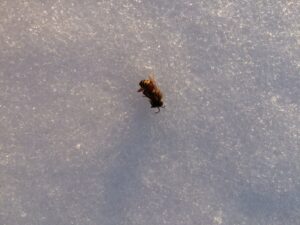
I was thrilled to find a dead bee in the snow. While I’m sorry she didn’t make it back, it told me that some bees were out recently on “cleansing flights.”
I’ve been rapping sharply on my hives every few weeks now. Most of them answer back with either a soft, barely discernable “chatter” or a significant “YES WE’RE IN HERE QUIT BOTHERING US!” quite audible roar. Unfortunately I know that bees alive mid-February doesn’t always translate to bees alive in April, but I find their reply reassuring.
Some of the hives are silent. I know from experience this doesn’t necessarily mean they’re dead, but if it is repeatedly silent every time I knock … well, time to at least draft their obituary.
Disrupting them with a knock probably isn’t best for them, but I want some idea of how many colonies are still alive. Now is the time to line-up sources lots of colonies will need to be replaced.
With a bee overwintering die-off rate of about 30%, I have few reasons to think our survival rate will be better. It was a cool, damp summer, and many of our hives went into fall without ample stores. We’ve had some bitter weather, and who knows—other than that giant rodent Phil—how long until spring.
Experience has taught me a great deal, but I’m still in the steep part of the beekeeping learning curve. Of course, my 77-year-old beekeeping buddy Jim, with a half-century of beekeeping under his belt, says he’s also still in the steep part of the learning curve!
I continue to learn a great deal about beekeeping. One thing I’ve learned is that just when you think you have it all figured out, the bees will fool you. (And I swear, they giggle a little bit as they do it.)
In the October 1925 edition of Modern Beekeeping, Ralph Ziegler shared a thought that always jars me a bit, and makes me reflect, plan, and ponder:
“…we are inclined to wonder how many of those who started with bees last spring are still beginners and how many are real beekeepers.
All have no doubt made mistakes.
Those who have blamed themselves for their errors, taking steps to correct them and prevent their happening again are real beekeepers, while those who blame the bees, the weather, the package bee shipper, the equipment manufacturers and everything else in sight are still just beginners.”
This is the time of year to order more bees if you think you might need them, and to reflect on what you might do differently to increase success. There are plenty of great bees’ schools this time of year, and plenty of great resources to help you figure out ways to improve.
You will undoubtedly, at some point, have winter losses. But one characteristic of a beekeeper is that hope springs eternal.
Please ponder your methods, and if you have losses, please get right back on the horse. The bees need us to do so.
